Events that led to the 1991 Madrid Middle East Peace Conference (MMEPC) provide core context for Israeli and Palestinian approaches toward resolving their conflict. Policies of the respective parties and their regional and international supporters evolve over time, including the very commitment to end the conflict between them. That public commitment did not take place until 1993. By then the Palestinian community had splintered into one side that wanted to test the negotiating process with Israel, and another, Hamas, that rejected then, as it does in 2021, any recognition of Israel, Zionism or a Jewish state.
The MMEPC was a U.S. success because it brought Arab states, Israel and a Palestinian delegation together to a public conference. Out of the MMEPC, additional Palestinian and Israeli understandings were achieved, but none reached a stage of ending the conflict.
It took more than four decades from Israel’s establishment and the emergence of the Palestinian refugee issue in 1948 for the sides to consider speaking in public. In that time, Israel solidified itself as a viable state while the Palestinians debated whether negotiations with Israel were a legitimate undertaking.
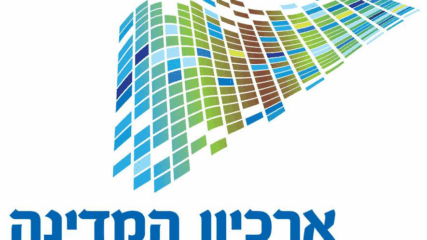
Israel State Archives — Selected Record Groups The Israel State Archives in Jerusalem are a treasure-trove for those seeking to understand Israel’s evolution. Successive archival groups reference Israel over the past century. More than the…
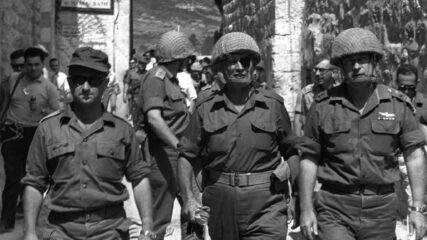
June 2025 CIE has compiled the following list of books and articles, including some available on our website, to guide understanding of Israel’s capital, the holy city of Jerusalem. Books Adelman, Madelaine, and Miriam Fendius…
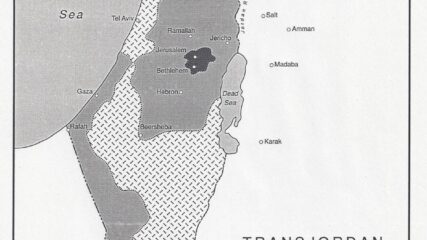
Ken Stein, President, Center for Israel Education, May 19, 2025 Introduction Since 1937, the idea of geopolitically separating Jewish and Arab populations west of the Jordan River has been a recommended solution to mitigate violence between…
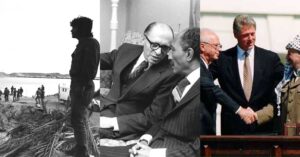
Unfold six Arab states’ embrace of Israel since 1973 out of national interests and U.S. mediation, sidelining the Palestinian movement, and explore Hamas’ Oct. 7, 2023, attack and its implications for the Israeli-Palestinian conflict and Israeli diplomacy.

Although considered pro-Israel, Reagan, the 40th U.S. president, acted to balance U.S. policy toward Israel and Arab states. Under Reagan, the United States halted F-16 sales to Israel after its raid on Iraq’s nuclear reactor…
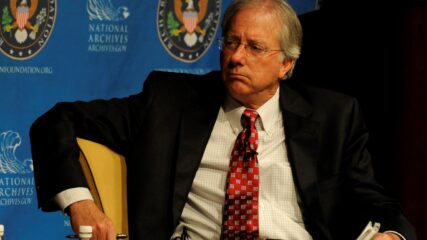
Working in the Defense Department, with the National Security Council or in the State Department under every president from Jimmy Carter to Barack Obama, Ross helped shape U.S. Middle East policy. He helped get Israel…
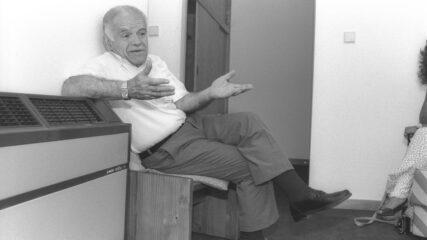
Belarus-born Shamir was the seventh prime minister, serving two terms between 1983 and 1992. He was a Lehi leader during the British Mandate. As a Likud prime minister, he approved Operation Solomon to airlift in…
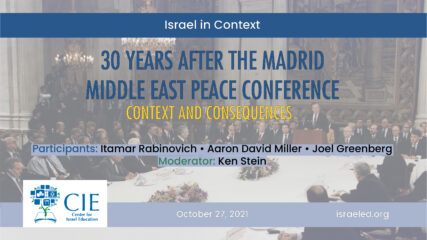
This 54-minute webinar, recorded Oct. 27, 2021, is part of the Center for Israel Education’s “Israel in Context” series and is incorporated into an extensive set of documents, study guides, videos and other resources CIE has compiled at https://israeled.org/madrid-conference/ to mark the 30th anniversary of the Madrid Middle East Peace Conference, when Israel first sat at the same table with all of its immediate Arab neighbors to talk peace.
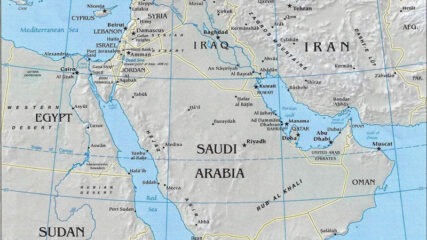
Historical Context Explore the historical context through the events and the documents leading up to the 1991 Madrid Middle East Peace Conference: 1949: Israel ends the War of Independence without secure borders or Arab acceptance….
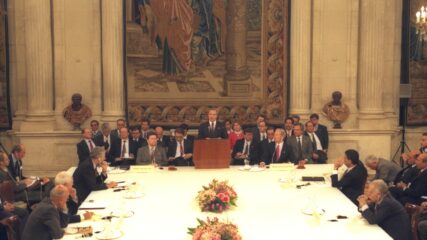
Some important moments at the Madrid peace conference take place behind the scenes when people who have been strangers and enemies make personal connections. But the speeches during three days of plenary sessions represent official…
October 25, 2021

On March 6, 1991, President George H.W. Bush tells Congress, “The time has come to put an end to the Arab-Israeli conflict.” For the next eight months, intensive shuttle diplomacy by Secretary of State James…
October 25, 2021

News consumers, whether reading newspapers, watching television or scrolling social media feeds, are responsible for filtering the facts from the spin and the slant. Here are some questions you should ask about anything you see…
October 25, 2021
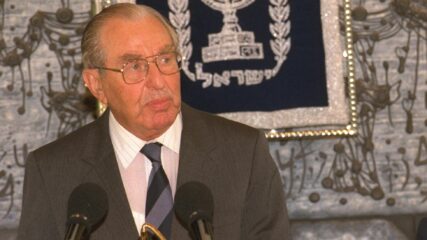
Eytan Bentsur, a member of the Israeli delegation at Madrid who became director-general of the Foreign Ministry, wrote a decade after the peace conference that President George H.W. Bush’s speech opening the conference laid out the principles for the…
October 25, 2021

Personal relationships and individual leadership styles can enhance or hamper negotiations. As an example, watch this video of Syrian Foreign Minister Farouk al-Shara and Palestinian delegate Saeb Erekat relishing memories of irritating Israeli Prime Minister…
October 22, 2021
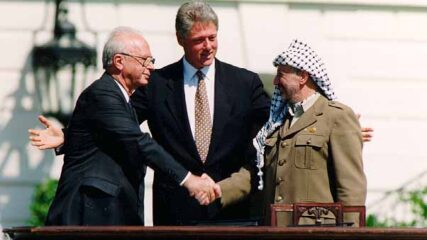
Key elements that affect whether ripeness for negotiations exists: Visit https://israeled.org/topic/arab-israeli-negotiations for more information on previous negotiations. Also see Stein and Lewis, “Making Peace Among Arabs and Israel: Lessons From Fifty Years of Negotiating Experience,”…
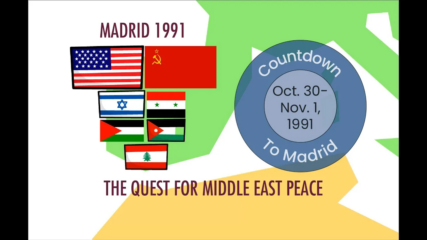
October 18, 2021 Examine the events that led the United States and the Soviet Union to convene high-level delegations from Israel and all of its immediate Arab neighbors, as well as other regional parties, in…
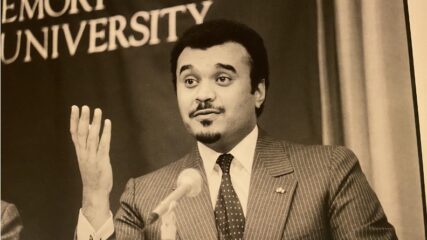
Ambassador Bandar Bin Sultan served as Saudi Arabia’s Ambassador to the United States from 1983 to 2006. From 2005 to 2015 he led the country’s National Security Council. He offers a scathing attack on Yasser Arafat’s failure to embrace multiple negotiating overtures proposed by Presidents Carter and Reagan. Additionally, he expresses his anger at the present Palestinian leadership for criticizing the UAE’s recognition of Israel in the 2020 Abraham Accords.
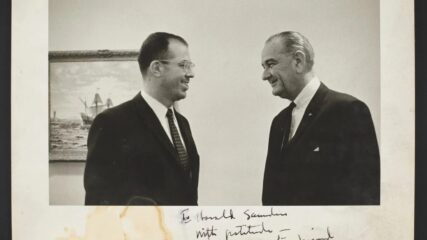
Many in the Arab world and amongst Palestinian leaders believe that, for the sake of evenhandedness and justice, the U.S. government, a longtime supporter of Israel’s security and existence, should have openly endorsed and urged others to vote for the proposition of Palestinian state recognition at the United Nations. Criticism of the U.S. failing to do so has been harsh, but it is also without perspective or historical context. What is forgotten is the persistent, even aggressive, perhaps unprecedented role that Washington has played in pushing for Palestinian rights, self-determination and, most recently, for Palestinian statehood.
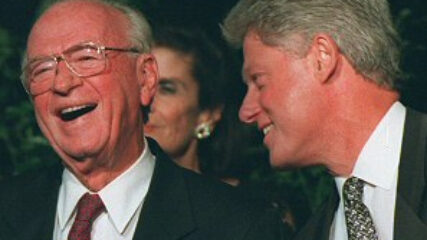
(November 1, 1995) Interview with Prime Minister Yitzhak Rabin by anchorman Ehud Yaari, Kol Yisra’el party affairs correspondent Yaron Dekel, and YEDI’OT AHARONOT political correspondent Shimon Schiffer
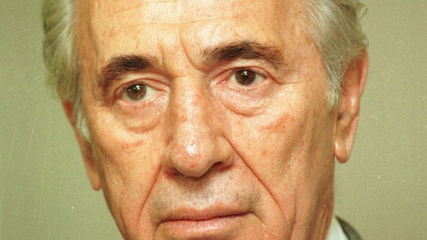
Foreign Minister Shimon Peres supports the Oslo Accords, opposes a Palestinian state and rejects Israel’s role in the Gaza Strip as the enforcer of security — all views that have continuing relevance for Gaza.
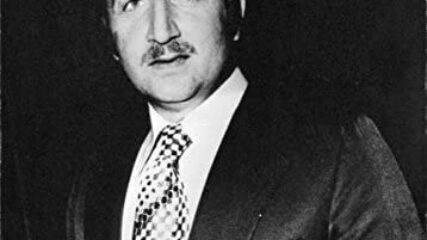
Jordanian Prime Minister Zaid Rifai lucidly explains Jordan’s role (inclusion and exclusion) in regional politics from before the 1973 October war to the late 1980s. His insights into Kissinger’s diplomacy and Arafat’s unfounded fear of being absorbed by Jordan are as worthy as they are insightful.
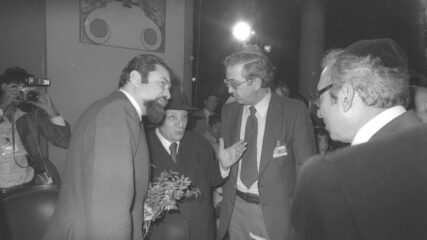
As a longtime confidant of Menachem Begin involved in the Herut party, Eliyahu Ben-Elissar was Israel’s first ambassador to Egypt. He was a staunch supporter of keeping the area of the West Bank — Judea and Samaria — under Israeli control. Later he became Israel’s ambassador to France and then the United States.

Yossi Ben-Aharon was the director general of Prime Minister Yitzhak Shamir’s office from 1988 to 1992. He was intimately involved in Israeli-U.S. negotiations that eventually saw a highly reluctant Israeli prime minister attend the October-November 1991 Madrid Middle East Peace Conference. Ben-Aharon’s evaluations of U.S. Secretary of State Baker, his assistant Dennis Ross, and President George H.W. Bush are insightful.
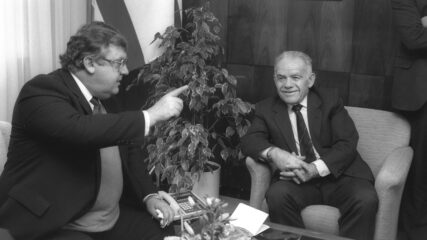
The U.N. General Assembly overwhelming reverses a Soviet-driven decision 16 years earlier to declare Zionism a form of racism.
























